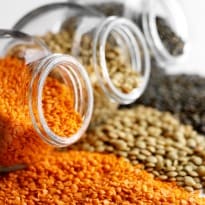It is a well-known fact that pulses and lentils are primary sources of protein. They are light on the stomach, aide in digestion and have a low glycemic index, which means that these take more time to be broken down and absorbed. The glycemic index measures the effect of foods on our blood glucose levels. Low glycemic diets have long been linked to lower risk of cardiovascular diseases, blood pressure, type 2 diabetes, strokes and depression. A recent study adds more to the list of its health benefits. Including pulses at least once a day in your daily intake can help you manage your weight. According to the research, pulses induce the feeling of fullness and satiate the sense of food cravings for a longer period of time. According to Dr John Sievenpiper of St Michael's Hospital's Clinical Nutrition and Risk Factor Modification Centre in Canada, a systematic review and meta-analysis of all available clinical trials found that people felt 31 per cent fuller after eating on average 160 grams of dietary pulses compared with a control diet. Sievenpiper noted that 90 per cent of weight loss interventions fail, resulting in weight regain, which may be due in part to hunger and food cravings.Knowing which foods make people feel fuller longer may help them lose weight and keep it off. The study was published in the journal Obesity and included nine clinical trials involving 126 participants out of more than 2,000 papers screened.
The finding that pulses make people feel fuller was true across various age categories and Body Mass Indexes. Although the analysis found pulses had little impact on "second meal food intake," the amount of food someone eats at his or her next meal, these findings support longer term clinical trials that have shown a weight loss benefit of dietary pulses.Another recently published systematic review and meta-analysis by Sievenpiper's research group has found that eating one serving of beans, peas, chickpeas or lentils everyday can also reduce "bad cholesterol" by five per cent and therefore lower the risk of cardiovascular diseases.Inputs from PTI
The finding that pulses make people feel fuller was true across various age categories and Body Mass Indexes. Although the analysis found pulses had little impact on "second meal food intake," the amount of food someone eats at his or her next meal, these findings support longer term clinical trials that have shown a weight loss benefit of dietary pulses.Another recently published systematic review and meta-analysis by Sievenpiper's research group has found that eating one serving of beans, peas, chickpeas or lentils everyday can also reduce "bad cholesterol" by five per cent and therefore lower the risk of cardiovascular diseases.Inputs from PTI
Advertisement








